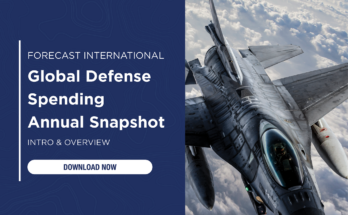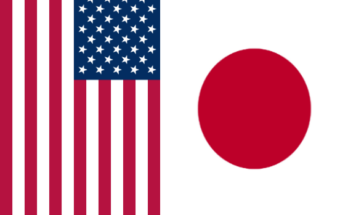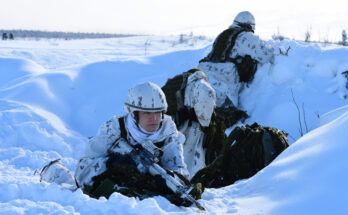by Nicholas Dawson, Forecast International.

Algeria & Morocco. Image: Mangostar, Public Domain, via Wikimedia Commons
Over the past several months, North African neighbors Algeria and Morocco have suffered a near breakdown of diplomatic relations. Algeria has continuously accused Morocco of trying to undermine the Algerian government while also setting wildfires in Algeria aimed at damaging its agricultural economy. Morocco has denied the accusations and countered that Algeria is trying to stir up trouble in the Western Sahara region by supporting and funding the Polisario Front, a group of rebels claiming that Western Sahara is not Moroccan territory but rather an independent country. The rivalry between the two countries is nothing new, stemming as far back as the time of their occupation by French forces. As both countries’ relations have once again hit rock bottom, this piece briefly explores the history of their rivalry as well as what has happened to bring about the recent cut of diplomatic ties between the two nations.
Both countries had been in France’s control until the 20th century. Morocco also had Spanish influence, as the Spaniards occupied the southern region known as Western Sahara. In 1956, Morocco gained freedom, with Spain staying in Western Sahara until 1976. Algeria, meanwhile, achieved liberation in 1962 after a long and bloody civil war. During the Algerian War of Independence, the Algerian rebels received funding from Morocco along with safe havens, arms, and medicine. After Algeria achieved independence, Morocco and Algeria almost immediately became embroiled in a dispute concerning territory, specifically Western Sahara and the Algerian-Moroccan borders. Thus would begin the 1963 Sand War between the two countries. Morocco had early successes against the weakened Algerian guerrilla force, but thanks to international assistance from Cuba, Algeria was able to beat back the Moroccans. Before two major military operations could be executed by the countries in abidance with their respective plans, the international community was able to get both countries to sign a peace treaty in 1964, affirming the previously established borders in Algeria’s favor. It wasn’t until 1972 that Morocco would abandon its claims on Algerian territory, although Morocco would later decide to not ratify a continuance of the initial agreement in 1989. The Sand War would be the start of the intense rivalry between the Moroccan monarchy and the Algerian government.
Besides the domestic strains between Algeria and Morocco, there had also been tensions between the two on the international stage. Algeria found itself aligning with the Soviet Union, with Morocco being backed by a pro-Western camp. This assistance from their respective foreign benefactors led to ideological differences between the countries, something that was first noticed by international observers during the Algerian War of Independence. The Algerian government was inherently revolutionary, which found inspiration in the USSR and socialist movements in its path to liberation. This is one of the main reasons Cuba would be a crucial ally to Algeria during the Sand War. By contrast, the United States would help Morocco during the Sand War in hopes that the Algerian ideology would be damaged or extinguished as the result of a Moroccan victory.
During the late 1970s and 1980s, Algeria was helping fund the Polisario Front in Western Sahara, which was formed after the Spanish left the area in 1975. Morocco had considered that region part of its territory – and still does. The group had engaged in multiple skirmishes with the Moroccans over time, especially after Mauritania dropped claims on the region. Morocco was trying to overcome Polisario resistance in order to gain control of West Sahara. Thus the Western Sahara War would wage from 1976 to 1991, with Algeria constantly helping the resistance front and breaking off relations with Morocco. Algeria would go so far as to expel 45,000 Moroccans from Algeria while accepting pro-Sahrawi refugees. Because Algeria’s economy was stronger at the time than Morocco’s, Morocco had grave concerns given that Algeria was able to field a larger tank force, Navy, and Air Force, giving it a distinctive edge should a conflict erupt between the two countries.
A brief Civil War in Algeria in the 1990s once again increased tensions as the Islamic group known as the Armed Islamic Group of Algeria (GIA) launched an uprising after the Algerian military instigated a coup following an Islamist victory in the election. The Algerians claimed that Morocco was funding the group, and Morocco blamed Algeria for a bomb explosion in Marrakech. The situation would lead to international intervention to halt the massacre of civilians by the GIA, and in the end the GIA was destroyed and Algeria destabilized during the 2000s. Morocco would keep the borders with its neighbor closed.
Recently, relations between Algeria and Morocco once again broke down . The Polisario Front has begun operations again and was found to still be funded by Algeria. To make matters worse, it was discovered in July 2021 that Morocco was using new spyware known as Pegasus, made by the NSO Group in collaboration with the Israeli defense industry. Morocco used Pegasus to spy on Algerian politicians and civil society activists. It is estimated over 6,000 phones were affected by the spyware, as was the phone of French President Emmanuel Macron. Additionally, in December 2020 Morocco worked out a deal with the United States under which it would normalize relations with Israel while the United States would recognize Western Sahara as Moroccan territory. Not only was Algeria furious over the decision regarding Western Sahara, but it was also hostile to Israel given that it is a part of the Arab League boycott of Israel. Algeria had constantly been blaming Morocco for plots against it, going as far as to accuse Morocco of supporting the movement that has started wildfires and of trying to destabilize the government. The movement is known as the Movement for the self-determination of Kabylie, and it has been trying to gain independence from Algeria since 2013. Recently it has been classified as a terrorist organization by Algeria. Algeria believes Morocco and Israel have been funding the liberation movement efforts that led to the wildfires. Whether true or not, these accusations have been ongoing since the 2011 Arab Spring. These events led to the severance of diplomatic relations between the two countries on August 24, 2021. Although Morocco has been trying to renew diplomatic ties with Algeria with support from Saudi Arabia and the Arab League, Algeria has continued to antagonize the situation by going so far as to stop supplying gas to Morocco and calling back its ambassador.
The two countries are major spenders on defense and security. In Forecast International’s analysis of the African defense market for 2021, Algeria and Morocco are ranked 1st and 2nd, respectively, in total defense spending for all of Africa (not counting Egypt, which FI covers in its Middle East analysis). Put into perspective, Algerian defense spending amounts to almost 27 percent of defense spending for all of Africa. For comparison, Morocco accounts for almost 13.5 percent of all defense spending in Africa. Those two alone represent over two-fifths of all defense spending for the continent. FI’s forecast also points that both countries will continue to increase their defense budgets, a practice that had been the norm until 2020 and the outbreak of the COVID-19 pandemic. Algeria has traditionally had a better economy and larger military arsenal than Morocco, a situation dating back to the Western Sahara war. Algeria’s equipment is mostly bought from Russia, while Morocco’s is mostly obtained from Western countries. The ongoing increases in defense spending show that the arms race between the two continues. Even with a disadvantage in terms of military size, Morocco has constantly fought the Polisario Front and has been able to find success in its operations thanks to efficient drone strikes.
The region of North Africa itself is in turmoil due to the various political events of the past decade. Libya, which was traditionally a Moroccan ally, is still going through a decade-long civil war following the killing of its previous ruler, Muammar al-Qadhafi. The international community has attempted to bring eastern and western Libya together again, as at present there are two governments claiming legitimacy, but these efforts have not panned out well, despite a possible election at the end of the year. Meanwhile, Tunisia, traditionally an Algerian ally and part of an agreement between the two and Mauritania, has been having a constitutional crisis as Tunisian President Kais Saied tries to reform the government after a power grab in July. With their regional allies going through troubled times and facing the threat of potential terror attacks by Al-Shabaab and other extremist groups, both Algeria and Morocco are under massive pressure.
With these situations playing out, it is unlikely that the two rivals would go into a hot conflict unless a drastic event occurs to throw off the balance of power in the region. History has shown that throughout their relationship, Algeria and Morocco would eventually open back up with one another and try to stabilize relations. As an example, both countries waived visas for each other in 2004 and 2006, allowing for easier travel. Both countries want to be regional powers and the regional hegemon, and starting a conflict would impede their goal of being regarded as key international players. For now, we can expect the continuance of a stalemate between them, with a small chance of conflict.
For 50 years, Forecast International intelligence reports have been the aerospace and defense industry standard for accurate research, analysis, and projections. Our experienced analysts compile, evaluate, and present accurate data for decision makers. FI's market research reports offer concise analysis of individual programs and identify market opportunities. Each report includes a program overview, detailed statistics, recent developments and a competitive analysis, culminating in production forecasts spanning 10 or 15 years. Let our market intelligence reports be a key part of reducing uncertainties and mastering your specific market and its growth potential. Find out more at www.forecastinternational.com




